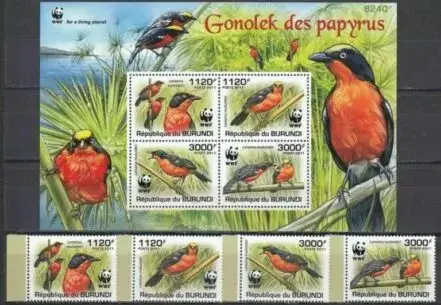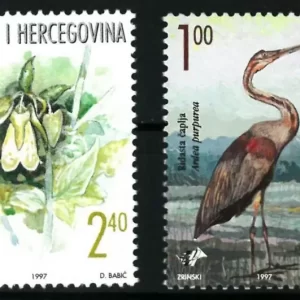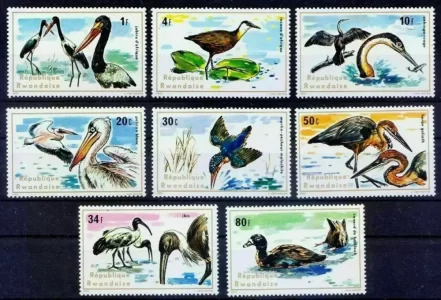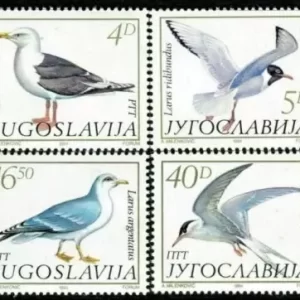Burundi year 2011 stamps WWF – Birds – The Papurys Gonolek MNH
The Purple-throated Cordonbleu (Uraeginthus salva), also known as the Purple Grenadier or Purple-backed Cordon-bleu, is a species of small passerine bird in the family Estrildidae, which is native to the grasslands of East Africa. Here are some interesting facts about this colorful bird:
- Appearance: As its name suggests, the Purple-throated Cordonbleu is characterized by its vibrant purple throat and chest, which contrasts with its blue back and wings. It also has a red bill and legs, adding to its striking appearance.
- Sexual Dimorphism: Like many bird species, male and female Purple-throated Cordonbleus have different appearances. Males typically have more intense and extensive purple coloring on their throats and chests, while females have duller plumage with less purple.
- Habitat: These birds inhabit savannas, grasslands, and scrublands with scattered trees and bushes. They are commonly found in semi-arid regions and often occur near water sources.
- Diet: Purple-throated Cordonbleus primarily feed on seeds, especially grass seeds, but they also consume small insects and occasionally fruits. They forage on the ground or in low vegetation for their food.
- Breeding: During the breeding season, males perform courtship displays to attract females. Once a pair forms, they build a small, cup-shaped nest usually hidden in dense vegetation. The female lays and incubates the eggs while the male provides food.
- Social Behavior: Purple-throated Cordonbleus are often seen in small flocks outside of the breeding season. They are social birds and may form larger groups when foraging or roosting.
- Vocalization: These birds are known for their melodious calls, which include a series of soft, musical notes. They use vocalizations for communication within their flocks and during courtship displays.
- Conservation Status: The Purple-throated Cordonbleu is not currently considered globally threatened, although localized declines may occur due to habitat loss and fragmentation. They are popular as aviary birds and are sometimes kept in captivity.
- Range: Their range extends across eastern Africa, including countries such as Kenya, Tanzania, Uganda, Ethiopia, and Somalia. They are typically found at elevations below 2,000 meters.
- Role in Ecosystem: As seed-eaters, Purple-throated Cordonbleus play a role in seed dispersal, which contributes to the health and diversity of their ecosystems.









Reviews
There are no reviews yet.